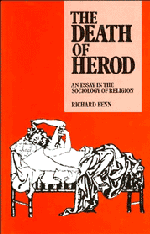Book contents
- Frontmatter
- Contents
- Acknowledgments
- Introduction
- 1 Two methodological viewpoints: the priestly and the prophetic
- 2 Description, interpretation, and explanation: modes of analysis
- 3 Levels of observation and of analysis: making the right choices
- 4 “What is going on here?” The role of the observer and the beginnings of theory
- 5 The search for useful concepts: evil and charisma
- 6 The making of a theory
- Epilogue
- References
- Author index
- Subject index
- Index of biblical citations
- Frontmatter
- Contents
- Acknowledgments
- Introduction
- 1 Two methodological viewpoints: the priestly and the prophetic
- 2 Description, interpretation, and explanation: modes of analysis
- 3 Levels of observation and of analysis: making the right choices
- 4 “What is going on here?” The role of the observer and the beginnings of theory
- 5 The search for useful concepts: evil and charisma
- 6 The making of a theory
- Epilogue
- References
- Author index
- Subject index
- Index of biblical citations
Summary
In order to reproduce itself any society must ensure that the next generation knows the language of the community and, more than its language, the rules for engaging in the most fundamental aspects of speech. At its core, I have suggested, a society consists of acts of speech such as appeals and confessions, lies and testimonies, conversations and addresses, exhortations and demands, questions and laments. When a society cannot be sure how to “take” someone, that person becomes suspect. When that person is someone in authority, the very credibility and the legitimacy of a society are at stake.
Now, there are many reasons why a society's acts of speech should be difficult to construe. In this short methodological essay I have pointed to a few of the factors that make language and speech even more than usually suspect and slippery. When generations are in subtle conflict, when the dependent generation both idealizes but also envies the older generation and its powers, then the stage is set for speech to be slippery or even deceptive. When, moreover, one generation reveals itself only in networks that are closed to the older one, speech itself becomes not only oily but opaque. In addition, both generations may inhabit two social systems that interpenetrate and rival each other, so that it is seldom clear in what capacity a particular individual is speaking or even to what audience.
- Type
- Chapter
- Information
- The Death of HerodAn Essay in the Sociology of Religion, pp. 182 - 191Publisher: Cambridge University PressPrint publication year: 1992



